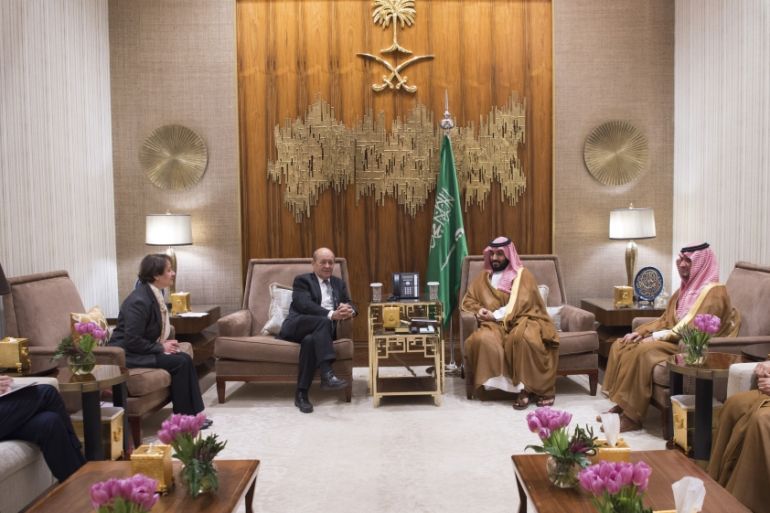HRW lambasts Saudi counterterrorism law
Kingdom ‘methodically silencing and locking away peaceful critics on spurious charges’, says Human Rights Watch.

Human Rights Watch has denounced Saudi Arabia’s new counterterrorism law, saying it could further enable authorities in the kingdom to silence critics.
The law, introduced earlier this month, includes penalties of up to 10 years in jail for insulting the king and crown prince, as well as the death penalty for other acts of “terrorism”, according to Saudi Gazette and other local news media.
Keep reading
list of 4 itemsQatar emir condemns ‘genocide’ in Gaza, urges ceasefire at GCC summit
‘Enduring commitment’: Key takeaways from US-GCC joint statement
Analysis: Efforts to end Assad isolation gather speed after quake
“Saudi authorities are already methodically silencing and locking away peaceful critics on spurious charges,” Sarah Leah Whitson, HRW’s Middle East director, said in a statement on Thursday.
“Instead of improving abusive legislation, Saudi authorities are doubling down with the ludicrous proposition that criticism of the crown prince is an act of terrorism.”
There was no immediate comment on the HRW statement from Saudi authorities, who have long been criticised for the country’s human rights record.
The new law comes as Crown Prince Mohammed bin Salman, the 33-year-old heir to the throne, consolidates power to a degree that is unprecedented in recent Saudi history.
The passage of the legislation, which replaces another widely criticised counterterrorism law introduced in 2014, coincided with a major government crackdown on the kingdom’s elites, ostensibly to fight corruption.
‘Overly broad definitions’
The new law includes “overly broad definitions” of acts of terrorism, which are not limited to violent acts, HRW said.
“It defines as terrorism ‘disturbing public order’, ‘shaking the security of the community’, and […] ‘suspending the basic laws of governance’, all of which are vague and have been used by Saudi authorities to punish peaceful dissidents and activists,” it said.
|
|
In May, a UN special rapporteur on human rights demanded that Saudi Arabia stop using an “unacceptably broad definition of terrorism” to target human rights defenders, writers, bloggers and other critics.
Almost in tandem, Saudi Arabia has reached a turning point in how it views its strategic role in the Middle East since Mohammed bin Salman was named crown prince in June.
He is also the country’s defence minister.
His latest move, the arrest in a corruption crackdown of more than 30 senior figures, including members of the extended royal family – has been interpreted by critics as a political purge to defuse public disquiet over corruption at the highest levels, but also to neutralise potential rivals.
But Mohammed bin Salman’s efforts to assert the kingdom’s regional primacy through an assertive foreign policy have backfired in Yemen and Qatar, and are opening a new front in Saudi Arabia’s regional rivalry with Iran.
Egypt and Saudi Arabia, along with the kingdom’s Arab Gulf neighbours Bahrain and the UAE, launched a blockade against Qatar in June, accusing the country of supporting “terrorism”. Qatar strongly denies the allegation.
Public relations stunt
Madawi al-Rasheed, a visiting professor at the London School of Economics, said the rise of Mohammed bin Salman represents a concentration of power in a country once distinguished by multiple “fiefdoms” in which power was shared between clans.
She dismisses the corruption crackdown as a public relations stunt.
Speaking at a recent conference in London titled Crisis in Saudi Arabia: War, Succession and the Future, which was attended by nearly 200 people, she said: “Of course, this is a great PR initiative because all of us love to see those corrupt people behind bars, but these anti-corruption purges take place in an opaque kingdom with no freedom of expression and with no independent judiciary.
“We know that dictators pick a few people, put them in jail, accuse them of corruption, and that’s a very effective, populist way of getting rid of your rivals.”
Speakers at the conference described a country in crisis, from its contribution to more bloodshed in Yemen to its growing rivalry with Iran, as it attempts to convince the rest of the world that liberalism is expanding at home.
Madawi warned liberals outside Saudi Arabia not to be “taken in” by Mohammed bin Salman’s recent reforms concerning women, such as permitting them to drive.
“These are media and PR exercises that want us to believe that the regime has actually changed,” she said.
“Nothing has changed, all we have seen is a concentration of power in the hands of one man and a purge of the […] regime to pave the way for the arrival of a new elite that will appropriate the resources and that is under no obligation to explain its budget or its corruption to anybody.”